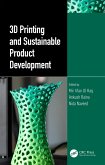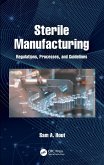Handbook of 3D Printing in Pharmaceutics
Innovations and Applications
Herausgeber: Katakam, Prakash; Babbar, Atul; Ranjan, Nishant; Kumar, Ranvijay
Handbook of 3D Printing in Pharmaceutics
Innovations and Applications
Herausgeber: Katakam, Prakash; Babbar, Atul; Ranjan, Nishant; Kumar, Ranvijay
- Gebundenes Buch
- Merkliste
- Auf die Merkliste
- Bewerten Bewerten
- Teilen
- Produkt teilen
- Produkterinnerung
- Produkterinnerung
3D printing has evolved as an emerging tool for the design of customized or personalized medication that provides the maximum therapeutic benefits to patients. The manufacturing of medicines in small batches customized with tailored dosages, sizes, shapes, and drug release properties is the key prospect of using 3D printing in pharmaceutics.
Andere Kunden interessierten sich auch für
![3D Printing and Sustainable Product Development 3D Printing and Sustainable Product Development]() 3D Printing and Sustainable Product Development165,99 €
3D Printing and Sustainable Product Development165,99 €![Wire ARC Additive Manufacturing Wire ARC Additive Manufacturing]() Wire ARC Additive Manufacturing163,99 €
Wire ARC Additive Manufacturing163,99 €![Sterile Manufacturing Sterile Manufacturing]() Sam A HoutSterile Manufacturing110,99 €
Sam A HoutSterile Manufacturing110,99 €![Sustainable Product Design and Development Sustainable Product Design and Development]() Anoop DesaiSustainable Product Design and Development174,99 €
Anoop DesaiSustainable Product Design and Development174,99 €![Hybrid Metal Additive Manufacturing Hybrid Metal Additive Manufacturing]() Hybrid Metal Additive Manufacturing175,99 €
Hybrid Metal Additive Manufacturing175,99 €![Solid State Additive Manufacturing Solid State Additive Manufacturing]() Solid State Additive Manufacturing175,99 €
Solid State Additive Manufacturing175,99 €![Additive Manufacturing Processes in Biomedical Engineering Additive Manufacturing Processes in Biomedical Engineering]() Additive Manufacturing Processes in Biomedical Engineering174,99 €
Additive Manufacturing Processes in Biomedical Engineering174,99 €-
-
-
3D printing has evolved as an emerging tool for the design of customized or personalized medication that provides the maximum therapeutic benefits to patients. The manufacturing of medicines in small batches customized with tailored dosages, sizes, shapes, and drug release properties is the key prospect of using 3D printing in pharmaceutics.
Hinweis: Dieser Artikel kann nur an eine deutsche Lieferadresse ausgeliefert werden.
Hinweis: Dieser Artikel kann nur an eine deutsche Lieferadresse ausgeliefert werden.
Produktdetails
- Produktdetails
- Verlag: CRC Press
- Seitenzahl: 233
- Erscheinungstermin: 10. Dezember 2024
- Englisch
- Abmessung: 234mm x 156mm x 16mm
- Gewicht: 526g
- ISBN-13: 9781032572789
- ISBN-10: 1032572787
- Artikelnr.: 70974585
- Herstellerkennzeichnung
- Libri GmbH
- Europaallee 1
- 36244 Bad Hersfeld
- gpsr@libri.de
- Verlag: CRC Press
- Seitenzahl: 233
- Erscheinungstermin: 10. Dezember 2024
- Englisch
- Abmessung: 234mm x 156mm x 16mm
- Gewicht: 526g
- ISBN-13: 9781032572789
- ISBN-10: 1032572787
- Artikelnr.: 70974585
- Herstellerkennzeichnung
- Libri GmbH
- Europaallee 1
- 36244 Bad Hersfeld
- gpsr@libri.de
Prakash Katakam is a pharmaceutical scientist working as professor and principal at Indira College of Pharmacy, Nanded, India. He has more than 27 years of professional experience as a teacher and researcher. He published over 150 research articles in indexed journals and guided 14 PhD students. His research areas are 3D printing for personalized drug delivery, pulmonary delivery of vaccines, micro/ nanoparticles, phytoformulations and drug discovery. He is the founder of a research laboratory on 3D printing, RxPrints Lab, 3DFying Inc., Hyderabad, India and Awarded for his invention, "Indigenous 3D Printer Customized Medicine and Pharmaceutics of the Year 2023", by IIT Bombay, India. His major research focus is on identifying applications of various polymers for 3D printing for patient- specific dosage forms. He has been co- principal investigator for a sponsored research project of National Tea Research Foundation, India. Recently he contributed a publication on "Navigating the Challenges of 3D Printing Personalized Medicine in Space Explorations: A Comprehensive Review" in Critical Reviews in Therapeutic Drug Carrier Systems Journal and a book chapter "Recent Advancements of Additive Manufacturing for Patient- Specific Drug Delivery" in the book, "Additive Manufacturing Processes in Biomedical Engineering", published by CRC Press (Taylor & Francis Group). Dr. Katakam also published a highly cited review article, "Top- Down and Bottom- Up Approaches in 3D Printing Technologies for Drug Delivery Challenges" in the journal Critical Reviews in Therapeutic Drug Carrier Systems. Ranvijay Kumar is an assistant professor at the University Centre for Research and Development, Chandigarh University. He received a PhD in Mechanical Engineering from Punjabi University, Patiala. Additive manufacturing, shape memory polymers, smart materials, friction- based welding techniques, advanced materials processing, polymer matrix composite preparations, reinforced polymer composites for 3D printing, plastic solid waste management, thermosetting recycling, and destructive testing of materials are Dr. Kumar's expertise. Dr. Kumar has won the prestigious CII MILCA award in 2020. He has co- authored more than 43 research papers in science citation indexed journals, and 38 book chapters, and has presented 20 research papers at various national/ international- level conferences. He has contributed extensively to the additive manufacturing literature with publications appearing in Journal of Manufacturing Processes, Composite Part: B, Rapid Prototyping Journal, Journal of Thermoplastic Composite Materials, Measurement, Proceedings of the Institution of Mechanical Engineers, Part C (iMeche Part C), Proceedings of the Institution of Mechanical Engineers, Part H: Journal of Engineering in Medicine, Journal of Thermoplastic Composite Materials, Materials Research Express, Proceedings of the National Academy of Sciences, India Section A: Physical Sciences, Journal of Central South University, Journal of the Brazilian Society of Mechanical Sciences and Engineering, Composite Structures, and CIRP Journal of Manufacturing Science and Technology. He is also the editor of the book "Additive Manufacturing for Plastic Recycling: Efforts in Boosting A Circular Economy" published by CRC Press (Taylor & Francis Group). Atul Babbar Nishant Ranjan is working as Assistant Professor at University Centre for Research and Development at Chandigarh University. Fused deposition-modeling, extrusion, thermoplastic polymers, the composition of thermoplastic polymers, natural and synthetic biopolymers, scaffolds printing, 3D printing technology, thermal, mechanical, morphological, and chemical properties of thermoplastic polymers, biocompatible and biodegradable fillers, reinforcement of materials are his main focused areas. He has co-authored more than 36 research papers in science citation index journals, 38 book chapters, and 2 books and presented more than 12 research papers at various national-level conferences.
Section 1: 3D Printing, Drug Delivery Systems, and Application Domain
Overview. 1. Advancements in Tailoring Medication Using 3D Printing. 2.
Innovative and Modified Additive Manufacturing Processes: Extended
Applications in the Pharmaceutical Industry. Section 2: Quality
Characteristics Challenge in 3D Printing of Pharmaceutical Products.
3.Navigating the Terrain of 3DP for Pharmaceutical Products: Quality
Conundrums and Solutions. Section 3: Extrusion-Based 3D Printing in
Pharmaceutics. 4. Extrusion-Based 3D Printing in Pharmaceuticals. 5.
Extrusion- Based 3D Printing Technology: A Revolution in Pharmaceutical
Drug Manufacturing. Section 4: Binder Jetting-Based 3D Printing in
Pharmaceutics. 6. Binder Jetting: A Versatile and Rapid Fast 3D Printing
Phenomenon. 7. Binder Jetting-Based 3D Printing in Pharmaceutics. Section
5: SLS and SLA-Based 3D Printing in Pharmaceutics. 8. SLS and SLA
Techniques in 3D Printing for Better Pharmaceutical Applicability of Soft
Materials. Section 6: Hybrid 3D Printing Techniques in Pharmaceutical
Applications. 9. Next Generation Computational Automation-Based Additive
Manufacturing of Pharmaceuticals: An Approach to Fabricate Precise
Medicine. Section 7: Social, Economic, Environmental, Quality and
Regulatory Aspects. 10. Social, Economic and Environmental Justifications
for 3D Printing of Pharmaceutical Products. 11. Quality Control Methods for
Three-Dimensional Printed Pharmaceuticals. 12. 3D Printed Pharmaceuticals:
Current Regulatory Scenario.
Overview. 1. Advancements in Tailoring Medication Using 3D Printing. 2.
Innovative and Modified Additive Manufacturing Processes: Extended
Applications in the Pharmaceutical Industry. Section 2: Quality
Characteristics Challenge in 3D Printing of Pharmaceutical Products.
3.Navigating the Terrain of 3DP for Pharmaceutical Products: Quality
Conundrums and Solutions. Section 3: Extrusion-Based 3D Printing in
Pharmaceutics. 4. Extrusion-Based 3D Printing in Pharmaceuticals. 5.
Extrusion- Based 3D Printing Technology: A Revolution in Pharmaceutical
Drug Manufacturing. Section 4: Binder Jetting-Based 3D Printing in
Pharmaceutics. 6. Binder Jetting: A Versatile and Rapid Fast 3D Printing
Phenomenon. 7. Binder Jetting-Based 3D Printing in Pharmaceutics. Section
5: SLS and SLA-Based 3D Printing in Pharmaceutics. 8. SLS and SLA
Techniques in 3D Printing for Better Pharmaceutical Applicability of Soft
Materials. Section 6: Hybrid 3D Printing Techniques in Pharmaceutical
Applications. 9. Next Generation Computational Automation-Based Additive
Manufacturing of Pharmaceuticals: An Approach to Fabricate Precise
Medicine. Section 7: Social, Economic, Environmental, Quality and
Regulatory Aspects. 10. Social, Economic and Environmental Justifications
for 3D Printing of Pharmaceutical Products. 11. Quality Control Methods for
Three-Dimensional Printed Pharmaceuticals. 12. 3D Printed Pharmaceuticals:
Current Regulatory Scenario.
Section 1: 3D Printing, Drug Delivery Systems, and Application Domain
Overview. 1. Advancements in Tailoring Medication Using 3D Printing. 2.
Innovative and Modified Additive Manufacturing Processes: Extended
Applications in the Pharmaceutical Industry. Section 2: Quality
Characteristics Challenge in 3D Printing of Pharmaceutical Products.
3.Navigating the Terrain of 3DP for Pharmaceutical Products: Quality
Conundrums and Solutions. Section 3: Extrusion-Based 3D Printing in
Pharmaceutics. 4. Extrusion-Based 3D Printing in Pharmaceuticals. 5.
Extrusion- Based 3D Printing Technology: A Revolution in Pharmaceutical
Drug Manufacturing. Section 4: Binder Jetting-Based 3D Printing in
Pharmaceutics. 6. Binder Jetting: A Versatile and Rapid Fast 3D Printing
Phenomenon. 7. Binder Jetting-Based 3D Printing in Pharmaceutics. Section
5: SLS and SLA-Based 3D Printing in Pharmaceutics. 8. SLS and SLA
Techniques in 3D Printing for Better Pharmaceutical Applicability of Soft
Materials. Section 6: Hybrid 3D Printing Techniques in Pharmaceutical
Applications. 9. Next Generation Computational Automation-Based Additive
Manufacturing of Pharmaceuticals: An Approach to Fabricate Precise
Medicine. Section 7: Social, Economic, Environmental, Quality and
Regulatory Aspects. 10. Social, Economic and Environmental Justifications
for 3D Printing of Pharmaceutical Products. 11. Quality Control Methods for
Three-Dimensional Printed Pharmaceuticals. 12. 3D Printed Pharmaceuticals:
Current Regulatory Scenario.
Overview. 1. Advancements in Tailoring Medication Using 3D Printing. 2.
Innovative and Modified Additive Manufacturing Processes: Extended
Applications in the Pharmaceutical Industry. Section 2: Quality
Characteristics Challenge in 3D Printing of Pharmaceutical Products.
3.Navigating the Terrain of 3DP for Pharmaceutical Products: Quality
Conundrums and Solutions. Section 3: Extrusion-Based 3D Printing in
Pharmaceutics. 4. Extrusion-Based 3D Printing in Pharmaceuticals. 5.
Extrusion- Based 3D Printing Technology: A Revolution in Pharmaceutical
Drug Manufacturing. Section 4: Binder Jetting-Based 3D Printing in
Pharmaceutics. 6. Binder Jetting: A Versatile and Rapid Fast 3D Printing
Phenomenon. 7. Binder Jetting-Based 3D Printing in Pharmaceutics. Section
5: SLS and SLA-Based 3D Printing in Pharmaceutics. 8. SLS and SLA
Techniques in 3D Printing for Better Pharmaceutical Applicability of Soft
Materials. Section 6: Hybrid 3D Printing Techniques in Pharmaceutical
Applications. 9. Next Generation Computational Automation-Based Additive
Manufacturing of Pharmaceuticals: An Approach to Fabricate Precise
Medicine. Section 7: Social, Economic, Environmental, Quality and
Regulatory Aspects. 10. Social, Economic and Environmental Justifications
for 3D Printing of Pharmaceutical Products. 11. Quality Control Methods for
Three-Dimensional Printed Pharmaceuticals. 12. 3D Printed Pharmaceuticals:
Current Regulatory Scenario.








